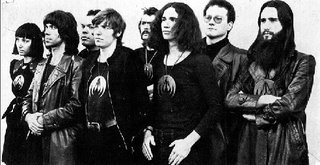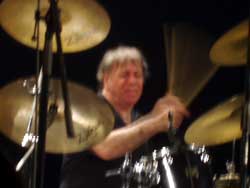Magma was formed in 1969 by a French jazz drummer named Christian Vander, whose main musical influence was the late-period music of John Coltrane, along with classical composers like Carl Orff and Bela Bartok. Vander's father was a well-known jazz pianist, and the young Vander got to meet many major musicians as a youth, including Coltrane. He was also fascinated by classical music, especially Orff and Bartok. The membership of Magma as never very stable, except for Vander and his wife Stella, who sang. (They can be seen at the left in the picture below.) Also, a vocalist of remarkable range and flexibility anchored the group during their most productive years, Klaus Blasquiz. (Seen to the far right.) Others came and went, but these stayed.
Vander had a vision (literally, according to some accounts) of an ecologically devastated Earth, and he began to compose an epic science-fiction saga as a sort of metaphor, a warning for mankind. Realizing that the French language was entirely unsuited for the sort of music that he envisioned (not enough consonants for the percussive sounds he heard), he created his own, called Kobaian, after the planet Kobaia, which is central to this saga. All of Magma's early albums are sung in this language, which has a very Slavic/Germanic quality. (One can even find a Kobaian/English dictionary online!) Klaus Blasquiz proved to be as committed to this musical vision as Vander was, and his contribution to this concept was integral. His singing is quite extraordinary, employing falsetto, "fry-tones" and other extended means of expression.

Magma, circa 1975.
Back in the late 70s and '80s, I collected pretty much everything that was available by this group. I owned at least ten or twelve albums of the band back then. When cds came along, and I simultaneously went through some intense personal upheaval, I sold them all. I hardly thought about this band for at least twenty years or so. A few weeks ago, I was surfing around the iTunes store and I thought I'd see if there were any Magma albums. I figured this was a total waste of time, but I typed the name in the search window and hit "enter." And nothing came up. Nothing, except about 17 albums or so, and several of them very inexpensive. I sampled a few of them and found that they sounded even better than than I remembered. A bunch of downloads later, I had a new collection. And Magma's music was even more impressive than ever. Further revelation came in the newly released live recordings from the BBC in 1974. Wow. (And not expensive, either.)
When I first listened to Magma, I had good instincts about music, but no technical or theoretical means of assessing what I heard. Now, they make even more of an impression, because I can clearly hear the polyrhythmic intricacies that Vander concocted. They made many fine albums, but for a one-disc intro to their music, Magma Live is the best. It features one of the best lineups that Vander ever put together, playing at an incredible level of virtuosity. The first track, the 30-minute "Kohntark" is a tour-de-force of visceral playing, welded to extremely sensitive compositional technique. Vander's drums are here better recorded than on some of their studio albums, too. Magma differs from other jazz-rock bands of their time in their singular musical vision, which eclipsed any individual aims in the group. There is no ego here. Soloing is minimal, or tightly controlled, according to Klaus Blasquiz solos were usually composed out by Vander. And the physical stamina that they had in playing pieces like this, with precision and endurance far beyond most bands, is truly exhilarating.

Christian Vander, today.






